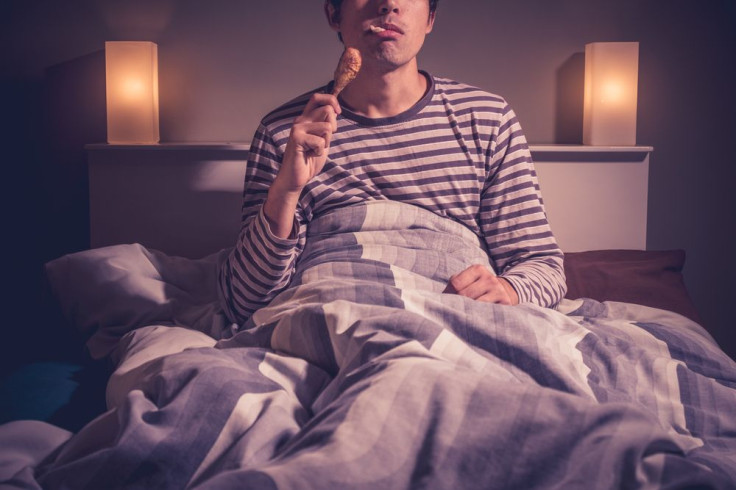The Midnight Snack Brain: Why Is It So Tempting To Eat After Dark?

Your late-night cravings might not be cravings at all, but rather a faulty mechanism in your brain that tells you to eat more. A new study from Brigham Young University has found that midnight snacking doesn’t produce the same reward signals that make people feel satisfied, which may lead them to overeat.
The more scientists point their equipment at the dietary choices we make, the more they discover things like will power and white-knuckling glasses of water don’t make people healthier. Human psychology prefers the path of least resistance to make decisions, and when it comes to late-night snacking, the brain doesn’t seem to get much out of a hunk of chocolate cake eaten with the refrigerator door still open.
A team of BYU scientists wanted to understand how the brain’s reward centers behave in response to food, depending on the time of day. These centers regulate our response to sex, drugs, and that chocolate cake you just scarfed down. So they put 15 women inside an fMRI scanner at two times during the day — once early in the morning and again in the evening — to measure their neural activity in response to images of food. Each woman saw low-calorie and high-calorie foods at both times during the day.
The results surprised the researchers. They initially thought the high-calorie foods would light up the reward centers in the evening, owing to the phenomenon of midnight cravings. But that’s not what they saw. Instead, participants’ brains showed a decreased response in the evening to both low-calorie and high-calorie foods. What’s more, even without any reported difference in their hunger levels the women said they could eat more in the evening compared to the morning.
For the experimenters, the story was beginning to take shape: At night, cravings aren’t a product of legitimate hunger as much as they are a sign the brain’s hormone balance is a little off.
“You might over-consume at night because food is not as rewarding, at least visually at that time of day,” said lead author Travis Masterson in a university press release. “It may not be as satisfying to eat at night so you eat more to try to get satisfied.”
You might think the brain has a direct line to the stomach that flips off some sort of hunger switch when it’s full of food. This isn’t the case. Loads of psychology research have shown the brain is actually pretty lousy at knowing when to stop eating. It takes its cues from all sorts of environmental factors, such as the pace at which dining companions are eating, the size of the dish or plate the food is served on, and the portion size of the food.
Consider a 2005 study in which researchers from Cornell University’s Food and Brand Lab gave 54 participants an ordinary-seeming bowl of soup. What the subjects didn’t know was the soup was bottomless: A tube snaked from a vat of soup below the table up through the bowl, so that it would keep refilling. People in the group with the rigged bowls ate 73 percent more soup than people eating from normal bowls. Their eyes saw more soup, so their stomachs said “Let’s eat.”
Together, these kind of findings give scientists room to be more creative with their study designs. The preliminary results of the BYU research show time of day has direct neural effects on people’s compulsion to eat. If we can keep in mind the hard truth that snacks won’t be as satisfying as we anticipate, we might be able to stop ourselves from indulging. Maybe.
Source: Masterson T, Kirwan C, Davidson L, LeCheminant J. Neural reactivity to visual food stimuli is reduced in some areas of the brain during evening hours compared to morning hours: an fMRI study in women. Brain Imaging & Behavior. 2015.



























